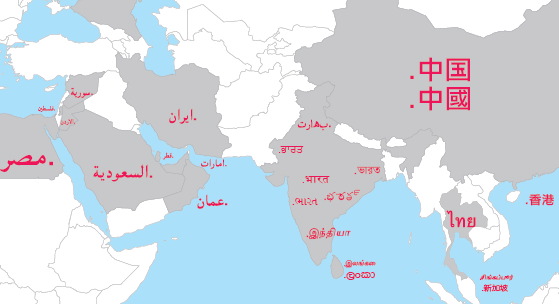
This visual depicts about half of the currently approved internationalized domain names (IDNs), positioned over their respective regions.
Notice the wide range of scripts over India and the wide range of Arabic domains. I left off the Latin country code equivalents (in, cn, th, sa, etc.) to illustrate what the Internet is going to look like (at a very high level) in the years ahead.
This next revolution is a linguistically local revolution. In terms of local content, it is already happening. Right now, more than half of the content on the Internet is not in English. Ten years from now, the percentage of English content could easily drop below 25%.
But there are a few technical obstacles that have so far made the Internet not as user friendly as it should be for people in the regions highlighted above. They’ve been forced to enter Latin-based URLs to get to where they want to go. Their email addresses are also Latin-based. This will all change over the next two decades.
For those of us who are fluent only in Latin-based languages, this next wave of growth is going to be interesting, if not a bit challenging. In a Latin-based URL environment, you can still easily navigate to and around non-Latin web sites and brands. For example, if I want to find Baidu in China, I can enter www.baidu.cn. For Yandex in Russia, it’s yandex.ru.
But flash forward a few years and these Latin URLs (though they’ll still exist) may no longer function as the front doors into these markets.
Try Яндекс.рф. It currently redirects to Yandex.ru.
In a few years, I doubt this redirection will exist.
We’re getting close to a linguistically local Internet — from URL to email address. There are still significant technical obstacles to overcome. It will be exciting to see which companies take the lead in overcoming them — as these companies will be well positioned to be leaders in these emerging markets.
UPDATE: I’ve expanded on this topic in a recent article on IP Watch.

I can see the future coming, but how many companies will take this challenge in the current economic climate? My prediction is most western companies will stick to English and get caught out from behind.
“Their email addresses are also Latin-based. This will all change over the next two decades.”
Browser developers need to take this into account. Currently, implementations of HTML5’s got this wrong, cf. http://www.alistapart.com/comments/forward-thinking-form-validation/P20/#28
Hi John,
I think that growing online presence by other cultures simply represent their economies catching up with the Western World.
I don’t think this trend signifies in any way that English will lose its role on the Web. We Westerners will remain were we are and use our ‘cyberspace’as we’be done by now.
So I don’t think growing number of websites in other languages present any challenges to us; it’s hardly worth calling a revolution which would imply a changing Web environment throughout the whole world.
No-one will force us to start using foreign alphabets on our Latin-based websites and also I believe there will be automated services in place to accommodate the changed domain names etc.
So in short – you can call me a old-fashion person but I don’t believe English will lose its role on the Web. Growing number of Chinese, Indian etc websites doesn’t mean they’ll ‘eat up’ our Latin-based domain names, URLs and websites…
Neither I can’t see how by sticking to English any Western based website could get caught out from behind – that’s Richard’s comment. Are you suggesting ‘smart’ companies will start hiring foreign speaking interpreters and IT guys to change their sites to Chinese, for example? I think Google translation service, for instance, already shows how easy it is to translate Web content with a click of a button. And theses technologies will get only better and better over time, so I think we can be looking at fully automated translation service depending on your target language etc. rather than ‘revolution’ that will drastically change the online ways of English speaking world.
Regards,
Robby